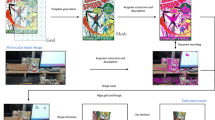Abstract
In this paper we describe a model-based method for recovering the 3D shape of faces using shape-from-shading. Using range-data, we learn a statistical model of the variation in surface normal direction for faces. This model uses the azimuthal equidistant projection to represent the distribution of surface normal directions. We fit the model to intensity data using constraints on the surface normal direction provided by Lambert’s law. We illustrate the effectiveness of the method on real-world image data.
Preview
Unable to display preview. Download preview PDF.
Similar content being viewed by others
References
Johnston, A., Hill, H., Carman, N.: Recognising faces: effects of lighting direction, inversion, and brightness reversal. Perception 21, 365–375 (1992)
Gregory, R.L.: Knowledge in perception and illusion. Phil. Trans. R. Soc. Lond. B 352, 1121–1128 (1997)
Georghiades, A., Belhumeur, P., Kriegman, D.: From few to many: Illumination cone models for face recognition under variable lighting and pose. IEEE Trans. PAMI 23, 643–660 (2001)
Atick, J.J., Griffin, P.A., Redlich, A.N.: Statistical approach to shape from shading: Reconstruction of 3D face surfaces from single 2D images. Neural Comp. 8, 1321–1340 (1996)
Zhao, W.Y., Chellappa, R.: Illumination-insensitive face recognition using symmetric shapefrom- shading. In: Proc. CVPR (2000)
Samaras, D., Metaxas, D.: Illumination constraints in deformable models for shape and light direction estimation. IEEE Trans. PAMI 25, 247–264 (2003)
Castelán, M., Hancock, E.R.: Acquiring height maps of faces from a single image. In: Proc. 3DPVT, pp. 183–190 (2004)
Prados, E., Faugeras, O.D.: Unifying approaches and removing unrealistic assumptions in shape from shading: Mathematics can help. In: Proc. ECCV, pp. 141–154 (2004)
Worthington, P.L., Hancock, E.R.: New constraints on data-closeness and needle map consistency for shape-from-shading. IEEE Trans. PAMI 21, 1250–1267 (1999)
Snyder, J.P.: Map Projections–AWorkingManual, U.S.G.S. Professional Paper 1395. United States Government Printing Office, Washington D.C. (1987)
Sirovich, L.: Turbulence and the dynamics of coherent structures. Quart. Applied Mathematics XLV, 561–590 (1987)
Blanz, V., Vetter, T.: A morphable model for the synthesis of 3d faces. In: Computer Graphics Proc. SIGGRAPH, pp. 187–194 (1999)
Frankot, R.T., Chellappa, R.: A method for enforcing integrability in shape from shading algorithms. IEEE Trans. PAMI 10, 439–451 (1988)
Author information
Authors and Affiliations
Editor information
Editors and Affiliations
Rights and permissions
Copyright information
© 2005 Springer-Verlag Berlin Heidelberg
About this paper
Cite this paper
Smith, W.A.P., Hancock, E.R. (2005). A Model-Based Method for Face Shape Recovery. In: Marques, J.S., Pérez de la Blanca, N., Pina, P. (eds) Pattern Recognition and Image Analysis. IbPRIA 2005. Lecture Notes in Computer Science, vol 3522. Springer, Berlin, Heidelberg. https://doi.org/10.1007/11492429_33
Download citation
DOI: https://doi.org/10.1007/11492429_33
Publisher Name: Springer, Berlin, Heidelberg
Print ISBN: 978-3-540-26153-7
Online ISBN: 978-3-540-32237-5
eBook Packages: Computer ScienceComputer Science (R0)




